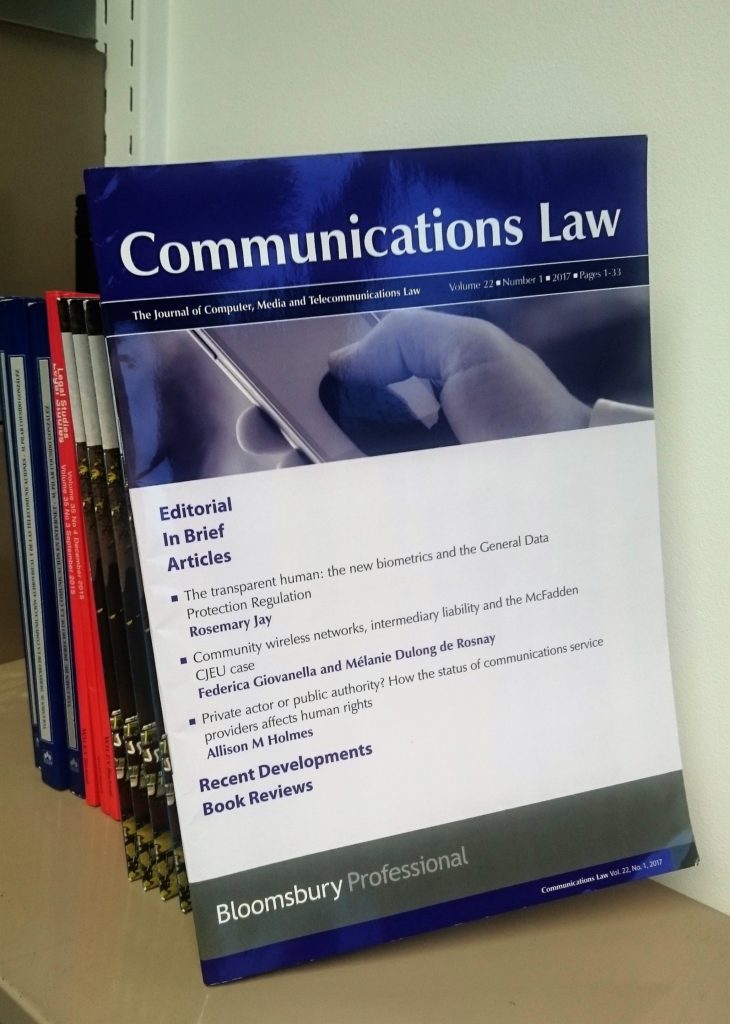 The Information Law and Policy Centre is pleased to announce the publication of a special issue of the Communications Law journal based on papers submitted for our annual workshop last November. The journal articles are available via direct subscription, through the Lexis Library (IALS member link) and (coming soon) Westlaw.
The Information Law and Policy Centre is pleased to announce the publication of a special issue of the Communications Law journal based on papers submitted for our annual workshop last November. The journal articles are available via direct subscription, through the Lexis Library (IALS member link) and (coming soon) Westlaw.
In the following editorial for the special issue, Dr Judith Townend, Lecturer in Media and Information Law, University of Sussex, (the outgoing Director of the ILPC, Institute of Advanced Legal Studies) and Dr Paul Wragg, Associate Professor of Law, University of Leeds discuss the challenges of information control in an ominous global environment.
This special issue of Communications Law celebrates the first anniversary of the Information Law and Policy Centre (ILPC) at the Institute of Advanced Legal Studies. It features three contributions from leading commentators who participated in the ILPC’s annual conference ‘Restricted and redacted: where now for human rights and digital information control?‘, which was held on 9 November 2016 and sponsored by Bloomsbury Professional.
The workshop considered the myriad ways in which data protection laws touch upon fundamental rights, from internet intermediary liability, investigatory and surveillance powers, media regulation, whistle-blower protection, to ‘anti-extremism’ policy. We were delighted with the response to our call for papers. The conference benefited from a number of provocative and insightful papers, from academics including Professor Gavin Phillipson, Professor Ellen P Goodman, Professor Perry Keller and Professor David Rolph as well as Rosemary Jay, Mélanie Dulong de Rosnay, Federica Giovanella and Allison Holmes, whose papers are published in this edition.
- The transparent human: the new biometrics and the General Data Protection Regulation, Rosemary Jay, (Lexis Library Link for IALS members)
- Community wireless networks, intermediary liability and the McFadden CJEU case, Federica Giovanella and Mélanie Dulong de Rosnay, (Lexis Library Link for IALS members)
- Private actor or public authority? How the status of communications service providers affects human rights, Allison M Holmes, (Lexis Library Link for IALS members)
The date of the conference, by happenstance, gave extra piquancy to the significance of our theme. News of Donald J Trump’s election triumph spoke to (and continues to speak to) an ominous and radically changed global environment in which fundamental rights protection takes centre stage. But as Trump’s presidency already shows, those rights have become impoverished in the rush to promote nationalism in all its ugly forms.
In the UK, the popularism that threatens to rise above all other domestic values marks a similar threat, in which executive decision-making is not only championed but also provokes popular dissent when threatened by judicial oversight. The Daily Mail’s claim that High Court justices were ‘enemies of the people’ when they sought to restrict the exercise of unvarnished executive power reminds us that fundamental rights are seriously undervalued.
Perhaps we should not be surprised at these events and their potential impact on communication law. In February 2015, at the ILPC’s inaugural conference Dr Daithí Mac Síthigh delivered a powerful paper in which he noted the rise of this phenomena in the government’s thinking on information law and policy under the Coalition Government 2010-15. In his view, following an ‘initial urgency’ of libertarianism, the mood changed to one of internet regulation or re-regulation. Such a response to perceived disorder, though not unusual, was ‘remarkable’ given how the measures in this field adopted during these final stages of the last government had been ‘characterised by the extension of State power in a whole range of areas.’ We should also note the demise of liberalism in popular thought. That much criticised notion which underpins all fundamental rights seems universally disclaimed as something weak and sinister. All of this speaks to a worrisome future in which the fate of the Human Rights Act remains undecided.
Concerns like these animate the papers in this special issue. The contribution from leading data protection practitioner Rosemary Jay, Senior Consultant Attorney at Hunton & Williams and author of Sweet & Maxwell’s Data Protection Law & Practice, is entitled ‘Heads and shoulders, knees and toes (and eyes and ears and mouth and nose…)’. Her paper discusses the rise of biometric data and restrictions on its use generated by the General Data Protection Regulation. As she notes, sensitive personal data arising from biometric data might be more easily shared, leading to loss of individual autonomy. It is not hard to imagine the impact unrestricted data access would have – the prospective employer who offers the job to someone else because of concerns about an applicant’s cholesterol levels; the partner who leaves after discovering a family history of mental ill heath; the bank that refuses a mortgage because of drinking habits. As Jay concludes, consent will play a major role in regulating this area.
In their paper, Federica Giovanella and Mélanie Dulong de Rosnay discuss community networks, a grassroots alternative to commercial internet service providers. They discuss the liability issues arising from open wireless local access networks after the landmark Court of Justice of the EU decision in McFadden v Sony Music Entertainment Germany GmbH. As they conclude, the decision could prompt greater regulation of, and political involvement in, the distribution of materials through these networks which may well represent another threat to fundamental rights.
Finally, Allison M Holmes reflects on the impact of fundamental rights caused by the status imposed on communication service providers. As Holmes argues, privacy and other human rights are threatened because CSPs are not treated as public actors when retaining communications data. As she says, this status ought to change and she argues convincingly on how that may be achieved.
